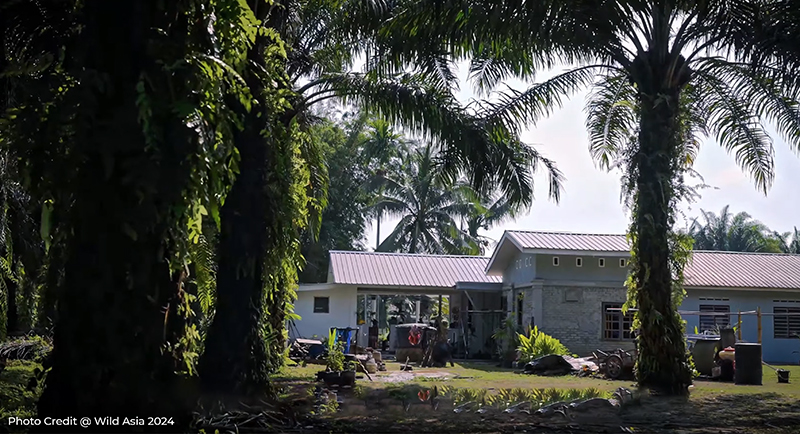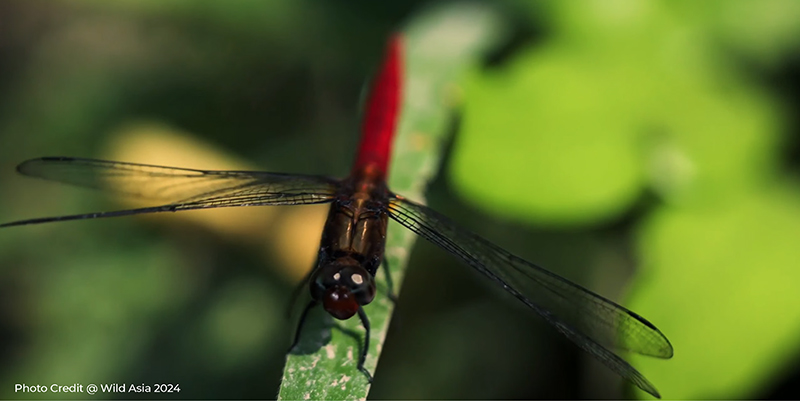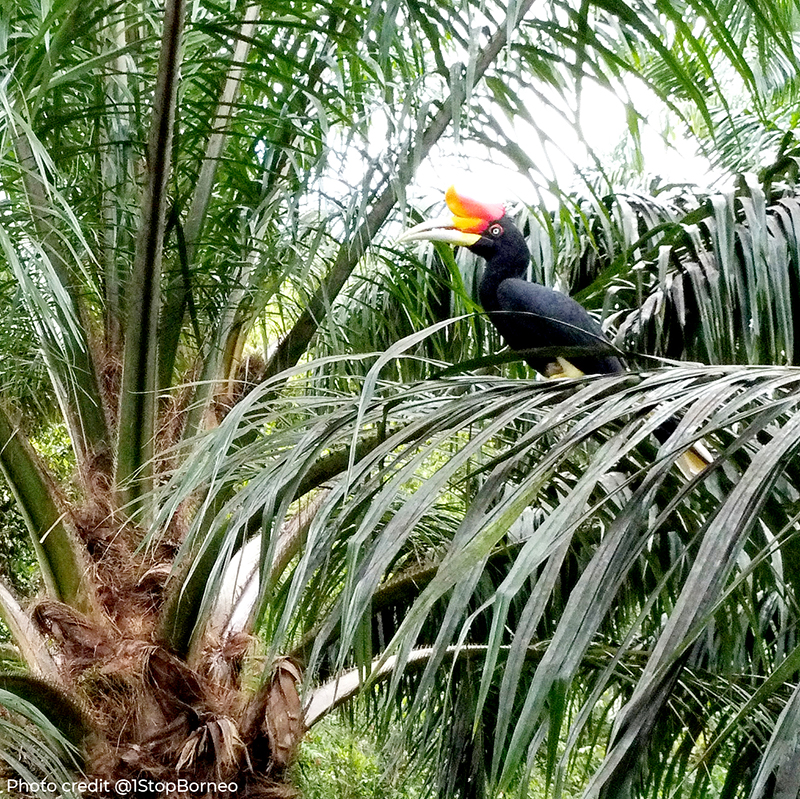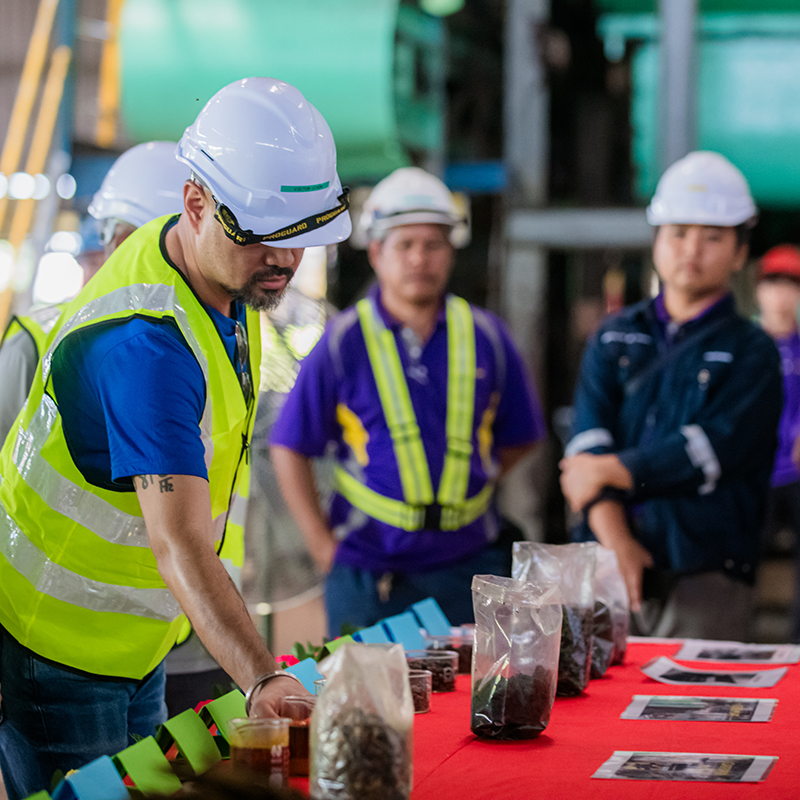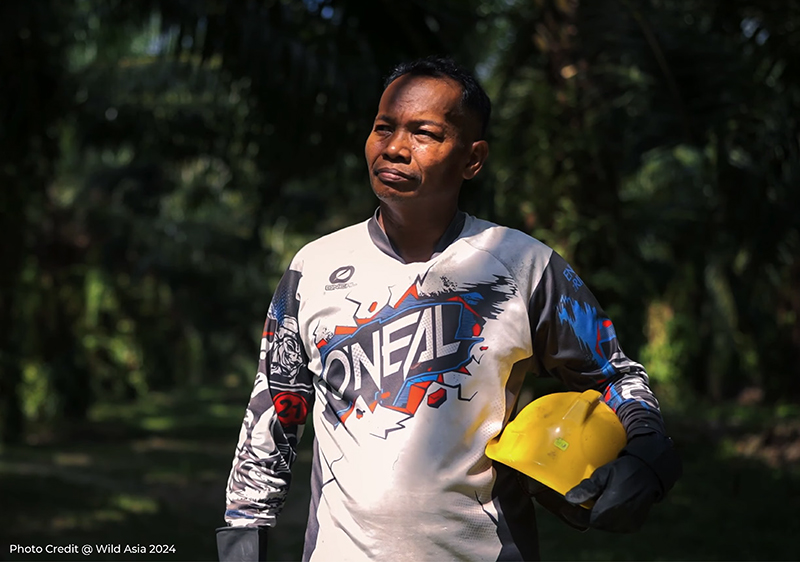
Bidin Loya, a Mah Meri oil palm independent smallholder for 30 years.
"Our ability to adapt and survive in this ever-shifting landscape is our biggest strength!" asserts Bidin Loya, a Mah Meri oil palm independent smallholder for 30 years.
We are seated in Bidin's living room in a spacious concrete house nestled in the laid-back village of Kampung Sungai Judah on Carey Island, 72 km southwest of Kuala Lumpur. The 51-year-old gives us a rundown of how the Mah Meri have evolved from their hunter-gatherer lineage to become certified sustainable farmers within three generations.
The Mah Meri History
The Mah Meri are one of 18 Orang Asli (original people; indigenous) tribes living in Peninsular Malaysia, with their distinct Besise' language and sociocultural background. Early traces of their nomadic ancestors were discovered in the coastal regions of southern Peninsular Malaysia since the 15th century. In the mid-1800s, the first Mah Meri settlements were found along the southwest coast of Selangor, including Pulau Gobow (now known as Carey Island – Nowak, 1985*). On an island blessed with lowland rainforest, mangrove swamps, mudflat shores, and rivers, the Mah Meri lived off the forest and the sea.
By 1895, the forest had been cleared for the first coconut plantation developed by the British colonials, followed by tea, rubber, coffee, and oil palms. As the forests disappeared, the Mah Meri had to rely on cash crop farming and plantation jobs for their livelihoods.
Today, three-quarters of Carey Island remains an oil palm estate. The rest of the island harbours five Mah Meri village settlements, including Sungai Judah. An hour's drive from Kuala Lumpur, Sungai Judah has a population of 515. Oil palm and fishing are the primary sources of livelihood here.
"My father was born here. In his lifetime, he fished, harvested nibong (Oncosperma tigillarium) palms, and planted rice, coconut, and coffee. But he struggled to feed our family of eight due to unstable income," says Bidin, who was also born in Sungai Judah and is the fourth of six siblings. He dropped out of school at 15 due to his family's financial hardships.
In the early 1980s, JAKOA (Department of Orang Asli Development) allocated agricultural land parcels to the villagers. Bidin's father, who was planting coffee then, switched to oil palm due to coffee's fluctuating prices.
Kampung Sungai Judah has a population of 515. Oil palm and fishing are the primary sources of livelihood here.
Steep Learning Curve
Like most independent smallholders, Bidin's father cultivated oil palm through trial and error and learned from his peers who worked at the nearby plantations. "We improvised as we went," says Bidin, who helped at his dad's farm. In 1995, Bidin started planting a 2-acre oil palm plot of his own, using seeds from his dad's farm. He was thrown straight in at the deep end. "Many of the inferior quality seedlings didn't survive. Plus, I couldn't afford to buy commercial fertilisers or pesticides," recalls Bidin. He used decomposed shrubs and palm fronds to manually fertilise the soil and control weeds by slashing.
Bidin was also juggling a full-time job as a heavy machinery operator with farming. "My farm was like a semak (overgrown with weeds) - a nightmare during harvest season," he adds. "And yields were low due to nutrient deficiency." The tide finally turned for him in 2009. Through JAKOA's help, he joined the Malaysian Palm Oil Board (MPOB)'s replanting programme, receiving quality seedlings and free chemical fertiliser. He intercropped the palm seedlings with banana trees to earn extra income.
In 2013, he received training and guidance from Tunjuk Ajar Nasihat Sawit (TUNAS) officers under MPOB's Sustainable Palm Oil Clusters (SPOC) initiative to achieve the Malaysian Sustainable Palm Oil (MSPO) standard for oil palm production. The same year, he quit his day job to focus full-time on oil palm.
By practising sustainable farming, more butterflies, birds, and grasshoppers are being spotted.
Bidin learned and embraced standard oil palm best practices to meet sustainability standards, such as reducing chemical inputs, stacking palm fronds 'correctly' to ensure optimum soil nutrients, and implementing the zero-burning policy. "My farming costs decreased, my trees are healthier, and my yields have improved," says Bidin, who became MSPO-certified in 2014. With a steady income, he could spend prudently on fertilisers and invest in a grass cutter to manage weeds. "Palm oil is our lifeline. Not only did it lift our community out of poverty, but it has also improved our living standards by leaps and bounds," says the father of eight, who earns a monthly average of RM2,000 from his 0.8ha farm. Bidin also manages his father-in-law's two farm plots (1.2ha), raking in about RM1,500 monthly.
In Sungai Judah, modern concrete houses have long replaced the simple wooden houses built in the 1970s. Stable electricity and water supply, tarred road access and internet connectivity are among the basic amenities accessible to everyone. "We renovated our house to expand the space, bought motorcycles, and paid for our children's education." The Mah Meri is known for their weaving tradition, which spans generations.
The womenfolk weave mengkuang (pandanus) and nipah (Nypa fruticans) leaves into household and ceremonial items. In early 2000, the Mah Meri women revived their weaving tradition by replanting pandanus clumps and crafting products to sell (Rahim, 2007**). Bidin's wife, Noraini Ageh, plants pandanus in their backyard, processes the leaves and weaves them into gorgeous mats, pouches, and baskets to supplement the family income.
Transition to Next-Level Farming
In 2021, Wild Asia extension agents came to Carey Island to engage independent smallholders in joining the Wild Asia Group Scheme (WAGS). WAGS offers free technical advice, training, and capacity building to help independent smallholder farmers meet international certification standards and improve their farm management practices. "Since I've been farming sustainably for several years, it's a good challenge to try for an international sustainability certification next," Bidin explains. "Also, earning premiums for certified crops is a good incentive!"
His farm received international sustainable certification in 2022. It has been four years now since Bidin stopped using pesticides. He uses a grass cutter to control weeds and maintains ground cover to retain soil moisture to deter pests like bagworms, which prefer dry conditions. So far, his palm trees have been spared any pest infestations or diseases.
"Initially, I stopped buying pesticides because of a cash crunch," says Bidin. "But I realised I can do without them (chemicals), and I'm seeing more insects and birds on my farm." Insect biodiversity plays a vital role in the ecosystem for pollination, pest control, and recycling of nutrients in soil.
Workshop participants learn to restore and reinvigorate soil using organic matter from the farm or enzyme fertilisers converted from kitchen wastes, and the benefits of intercropping to improve soil and farm biodiversity. “I hesitated at first because it sounded like a lot of work and commitment,” Bidin admits smilingly.“ But my wife encouraged me to give it a shot.”
He committed 0.8 hectares of his farm as a BIO plot (100% chemical-free) and offered his farm as a centre for Wild Asia to produce enzyme fertilisers in bulk to distribute to other farmers.
“It’s been six months since I started applying BIO juice and fish hydrolysate (liquid enzyme fertilisers). I can see worm castings, and the soil has improved - it has a rich, dark brown colour and an earthy smell. But it’s still too early to see any yield effects.” Bidin has stopped buying chemical fertilisers since last year and shaved off RM3,600 in annual fertiliser costs from his operating costs.
Paying the Way
To date, Bidin is only one of two farmers in Carey Island who have taken up the WAGS BIO gauntlet. “It’s not easy for our farmers to change their mindsets. But I can set the ball rolling and pave the way for others to follow,” Bidin sums up. “I hope my children and grandchildren will continue to farm sustainably to keep our land and earth healthy.
Bidin’s forefathers, who lived off the forest and valued healthy ecosystems, had to adapt their livelihoods to the changing world to ensure survival. Now, Bidin has become an inadvertent champion for regenerative farming and is reacquainted with the living soils. Sounds like he has come full circle.
Discover the inspiring story of Bidin in this short documentary and witness how sustainable oil palm planting has transformed his life.
In Malaysia, 5.65 million hectares of land have been cultivated with oil palm (MPOB 2023). Independent smallholder farms like Bidin Loya’s (40.46ha of land or less) account for 14.5% (0.82Mha) of this planted area. As of 2023, there are 214,980 independent smallholders in Malaysia.
*Nowak, Barbara S. (1985); The Formation of Aboriginal Reserves: The Effects of Land Loss and Development on the Btsisi’ of Peninsular Malaysia.
**Rahim, Reita (2007): CHITA’ HAE Culture, Crafts and Customs of the Hma’ Meri in Kampung Sungai Bumbon, Pulau Carey.
Article copyright @ Wild Asia 2024


